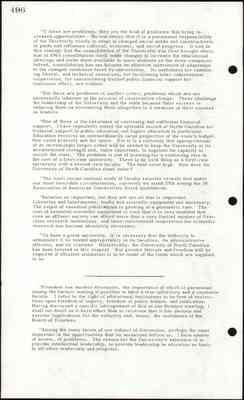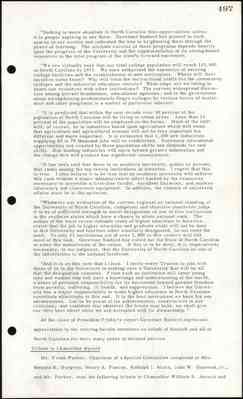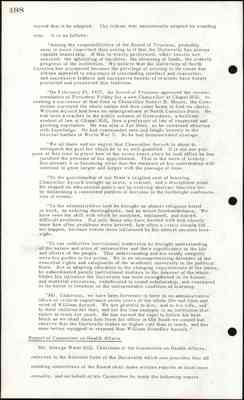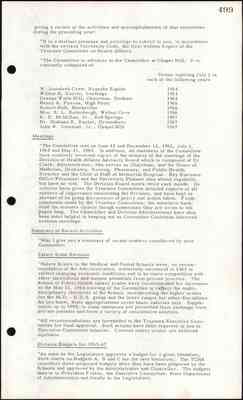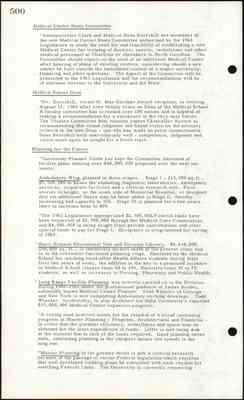Pages
496
"If these are problems, they are the kind of problems that bring increased opportunities. No one denies that it is a paramount responsibility of the University wisely to adapt to changed social needs and constructively to guide and influence cultural, economic, and social progress. It was in this concept that the consolidation of the University was first brought about, that in 1963 consolidation itself made changes to increase the educational offerings and make them available to more students on the three campuses. Indeed, consolidation has not become an effective instrument of adaptation to the changed conditions faced by universities. Its usefulness for combining liberal, and technical resources, for facilitating inter-indsitutional cooperation, for concentrating limited public financial support for maximum effect, are evident.
"But there are problems of another order, problems which are not necessarily inherent in the process of constructive change. These challenge the leadership of the University and the state because their success in reducing them or eliminating them altogether is a measure of their success as leaders.
"One of these is the assurance of continuing and sufficient financial support. I have repeatedly stated the splendid record of North Carolina for financial support to public education and higher education in particular. Education receives an extraordinarily large proportion of the state's budget. One could scarcely ask for more. But it is a certainty that appropriations of an increasingly larger order will be needed to keep the University at its accumstomed strength and, more important, to augment its capacity to enrich the state. The problem is one of planning for a continuing rise in the cost of a first-rate university. There is no such thing as a first-rate university with a second-rate faculty. The best come high. How does the University of North Carolina stand today?
"The most recent national study of faculty salaries reveals that under our most favorable circumstances, currently we stand 29th among the 38 Association of American Universities listed institutions.
"Salaries ar important, but they are not all that is important. Libraries and laboratories, books and scientific equipment are necessary. The output of essential publications is growing at a geometric rate. The cost of essential scientific equipment is such that it is very doubtful that even an affluent society can afford more than a very limited number of first- class research institutions, and inter-institutional cooperation for scientific research has become absolutely necessary.
"To have a great university, it is necessary that the authority to administer it be vested appropriately in its faculties, its administrative officers, and its trustees. Historically, the University of North Carolina has been favored in this respect. But greater latitude and freedom will be required if efficient utilization is to be made of the funds which are supplied to us.
"Freedom has another dimension, the importance of which is paramount among the factors making it possible to have a true university and a reputable faculty. I refer to the right of educational institutions to be free of restrictions upon freedom of inquiry, freedom of public debate, and publication. Having discussed a specific infringement of this at our October meeting, I shall not dwell on it here other than to reiterate that it has obvious and serious implications for the authority and, hence, the usefulness of the Board of Trustees.
"Among the many facets of our subject of discussion, perhaps the most important is the opportunities that lie unclaimed before us. I have spoken of assets, of problems. The reason for the University's existence is to provide intellectual leadership, to provide leadership in education as basic to all other leadership and progress.
497
"Nothing is more abundant in North Carolina than opportunities unless it is people aspiring to use them. Governor Sanford has pointed to dark spaces in our society and indicated the way to brightening them through the power of learning. The ultimate success of these programs depends heavily upon the progress of the University and the implementation of its strengthened resources in the total program of the state's forward movement.
"We are virtually sure that our total college population will reach 125,000 in North Carolina by 1975. We have authorized the expansion of existing college facilities and the establishment of new institutions. Where will their faculties come from? Who will train the instructional staffs for the community colleges and the industrial education centers? What steps are we taking to share our resources with other institutions? The current widespread discussion among private foundations, educational agencies, and in the government about strengthening predominately Negro colleges by various forms of assistance and other programs is a matter of particular interest.
"It is predicted that within the next decade over 50 percent of the population of North Carolina will be living in urban areas. Less than 14 percent of the population will be employed on the farms. Much of the shift will, of course, be to industries based upon agriculture which will mean that agriculture and agricultural science will not be less important but different and more important. It is estimated that 1,300 new industries supplying 60 to 70 thousand jobs will be established. Enormous educational opportunities are created by these population shifts and demands for new skills. Our leading industries will move toward greater automation and the change this will produce has significant consequences.
"It has been said that there is no southern university, public or private, that ranks among the top twenty institutions in America. I regret that this is true. I also believe it to be true that no southern university will achieve this rank without a major administrative effort backed by the resources necessary to assemble a first-line faculty, excellent libraries, and modern laboratory and classroom equipment. In addition, the climate of university affairs must be at the optimum.
"Whatever our evaluation of the current regional or national standing of the University of North Carolina, competent and objective observers judge it to be of sufficient strength to merit designation as one of five institutions in the southern states which have a chance to attain national rank. The author of the most recent reliable study of higher education in America states that the job in higher education and graduate study will not be done in this University and fourteen other similarly designated, do not meet the need. To only 23 institutions out of over 1,800 in this country will fall most of this task. Governor Sanford has called for the State of North Carolina to enter the mainstream of the nation. If this is to be done, it is imperatively necessary, in my judgment, that the University of North Carolina be one of the universities in the national forefront.
"And it is on this note that I close. I invite every Trustee to join with those of us in the University in making ours a University that will be all that the designation connotes. From such an institution will come young men and women who will have a knowledge and understanding of the world, a sense of personal responsibility for its movement toward greater freedom from poverty, suffering, ill health, and suppression. I believe the University has a major responsibility to make higher education in North Carolina contribute effectively to this end. It is the best instrument we have for our advancement. Let us be proud of its achievements, constructive in our criticism, and confident that whatever the future may hold, we shall give our very best effort while we are entrusted with its stewardship."
At the close of President Friday's report Governor Sanford expressed appreciation to the retiring faculty members on behalf of himself and all of North Carolina for their many years of devoted service.
Tribute to Chancellor Aycock
Mr. Frank Parker, Chairman of a Special Committee composed of Mrs. Mebane H. Burgwyn, Henry A. Foscue, Rudolph I. Mintz, John W. Umstead, Jr., and Mr. Parker, read the following tribute to Chancellor William B. Aycock and
498
moved that it be adopted. The tribute was unanimously adopted by standing vote. It is as follows:
"Among the responsibilities of the Board of Trustees, probably none is more important than seeing to it that the University has always capable leadership. If this is wisely performed, other results are assured: the upbuilding of faculties, the obtaining of funds, the orderly progress of the institution. We believe that the University of North Carolina has prospered because the privilege of serving in its cause has always appealed to educators of outstanding intellect and character; and successive leaders and successive boards of trustees have wisely protected and preserved this tradition.
"On February 25, 1957, the Board of Trustees approved the recommendation of President Friday for a new Chancellor at Chapel Hill. In seeking a successor at that time to Chancellor Robert B. House, the Committee surveyed the whole nation and then came home to find its choice. William Aycock had been an undergraduate at North Carolina State. He had been a teacher in the public schools of Greensboro, a brilliant student of law at Chapel Hill, then a professor of law of respected and growing reputation. He was also a Tar Heel; so he combined affection with knowledge. He had commanded men and fought bravely in the fiercest battles of World War II. So he had demonstrated courage.
"We all know and we regret that Chancellor Aycock is about to relinquish the post for which he is so well qualified. It is not our purpose at this time to prove how in the seven years since he took office he has justified the promise of his appointment. That is the work of history. But already it is becoming clear that the measure of his contribution will continue to grow larger and larger with the passage of time.
"To the guardianship of our State's original seat of learning Chancellor Aycock brought an acute, a trained, and a disciplined mind. He shaped its educational policy not by evolving abstract theories but by delineating a consistent pattern of decision in the forthright confrontation of events.
"To the administrative task he brought an almost religious belief in work, an exacting thoroughness, and an astute forehandedness. We have seen the skill with which he analyzed, explained, and solved, difficult problems. But only those who have worked with him closely know how often problems were averted, how often a crisis simply did not happen, because events were influenced by his almost uncanny foresight.
"To our collective institutional leadership he brought understanding of the nature and aims of universities and their significance in the life and affairs of the people. This understanding and his manly integrity were his guides to his action. He is an uncompromising defender of the essential rights and safeguards of the academic university in the political State. But in adapting education to the changing requirements of the times, he subordinated purely institutional matters to the interest of the whole. Under his influence the University has been strengthened in its human and material resources, rededicated to sound scholarship, and reassured in its belief in freedom as the indispensable condition of learning.
"Mr. Chairman, we have been fortunate to have in an administrative office of critical importance seven years of the whole life and time and mind of William Aycock. We are grateful to him, and to his wife, and to their children for that, and for his fine example in an institution that exists to train our youth. He has earned the right to follow his bent. Much as we shall miss him from his office in Old South we cannot but observe that the University makes no higher call than to teach, and has none better equipped to respond than William Brandley Aycock. "
Report of Committee on Health Affairs
Mr. George Watts Hill, Chairman of the Committee on Health Affairs, referred to the Revised Code of the University which now provides that all standing committees of the Board shall make written reports at least once annually, and on behalf of his Committee he made the following report
500
Medical Center Study Committee
"Administrator Clark and Medical Dean Berryhill are members of the new Medical Center Study Committee authorized by the 1963 Legislature to study the need for and feasibility of establishing a new Medical Center for training of doctors, nurses, technicians and other medical personnel at Charlotte or elsewhere in North Carolina. The Committee should report on the need of an additional Medical Center after hearing of plans of existing centers, considering should a new center be built outside the immediate context of a major university, financing and other questions. The report of the Committee will be presented to the 1965 Legislature and the recommendations will be of extreme interest to the University and the State.
Medical School Dean
"Dr. Berryhill, recent O. Max Gardner Award recipient, is retiring August 31, 1964 after over twenty years as Dean of the Medical School. A faculty committee has screened over 100 names and is hopeful of making a recommendation for a successor in the very near future. The Trustee Committee May minutes report Chancellor Aycock as recommending that sound judgment and broad vision be the primary criteria in the new Dean - one who has made no prior commitments. Dean Berryhill built marveloously well - competence, judgment and vision must again be sought for a fresh start.
Planning for the Future "University Planner Tuttle has kept the Committee informed of facility plans totaling over $40,000,000 proposed over the next ten years:
Ambulatory Wing, planned in three stages. Stage I - 215,000 sq.ft., $7,500,000 to house the exploding diagnostic laboratories, emergency services, outpatient facilities and a clinical research unit. Four stories in height, on the south side of Memorial Hospital, so designed that six additional floors may be later added in Stage II, thereby increasing bed capacity to 550. Stage III is planned for a few years later to increase beds to 800.
"The 1963 Legislature appropriated $2,500,000, Federal funds have been requested of $2,500,000 through the Medical Care Commission, and $4,500,000 is being sought from private contributions and other special funds to pay for Stage 1. Occupancy is programmed for spring of 1967.
"Basic Science Educational Unit and Division Library, $8,438,000, 250,000 sq. ft., is tentatively located north of the present clinic and is in the schematic functional planning stage. Operated by the Medical School but teaching most other Health Affairs students during their first two years of study, the addition is the key to a proposed increase in Medical School classes from 68 to 100, Dentistry from 50 to 75 students, as well as increases in Nursing, Pharmacy and Public Health.
"Long Range Facility Planning was actively carried on in the Division during 1900-1963 under the professional guidance of James Souder, nationally known Medical Center Planner. Todd Wheeler of Chicago and New York is now completing Ambulatory working drawings. Todd Wheeler, incidentally, is also Architect for Duke University's reported $55,000,000 Medical Center expansion program.
"A crying need however exists for the renewal of a broad continuing program of Master Planning - Program, Architectural and Financial - in order that the greatest efficiency, orderliness and space may be obtained for the least expenditure of funds. Little is now being done at the moment due to lack of the funds required. Good planning never ends, continuing planning is the cheapest money one spends in the long run.
"Master Planning in far greater detail is now a critical necessity because of the passage of recent Federal legislation which requires that well developed building plans be submitted with each request for matching Federal funds. The University is currently requesting
